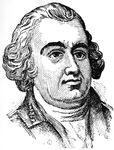
![]() Thomas Burke (1747-1783).
Thomas Burke (1747-1783).
Artist unknown.
Woodcut, undated.
Courtesy of North Carolina Division of Archives and History
Controversy Over a Prisoner Exchange: Thomas Burke and the Question of Unruly Congressmen
Despite the good intentions of Congress, General George Washington objected to some inconvenient congressional instructions regarding a prisoner exchange with the British. Angered at Washington's resistance, Congress considered issuing a written rebuke to Washington, demanding his cooperation. Heated debate over the reprimand continued well into the night of April 10, 1778. By 10:00PM, delegate Thomas Burke of North Carolina could stand no more. Displeased with the lack of respect shown to Washington and anxious to delay the proceedings, he left Congress and went home. Lacking a quorum, Congress sent a messenger to retrieve Burke, but he replied: "Devil a foot will I go tonight...It is too late and too unreasonable." The next morning, Congress charged Burke with breach of conduct, and asked him to explain himself. The North Carolinian insisted that he was not required to attend Congress during unreasonable hours, and that he was only responsible to his state legislature in North Carolina -- not to the Continental Congress. Congress was placed in the unpleasant situation of simultaneously needing Burke's presence for a quorum, and wanting to expel him for misconduct. Burke soon left Congress, was commended by his state legislature for his conduct, and returned to Congress with increased prestige.
